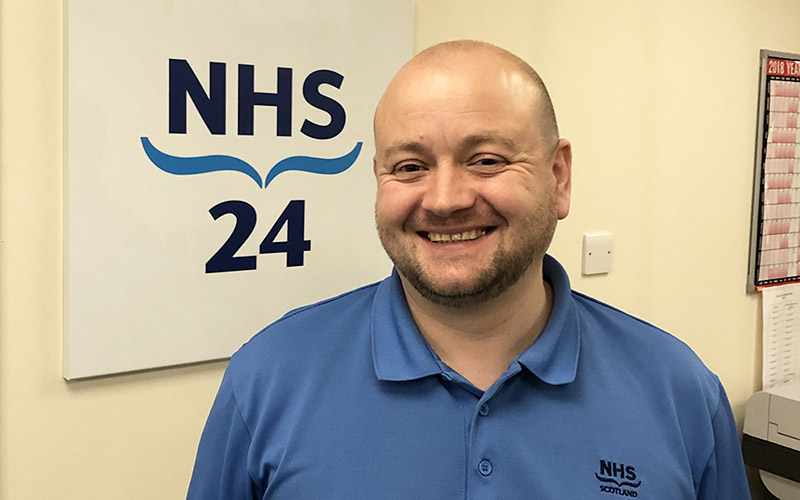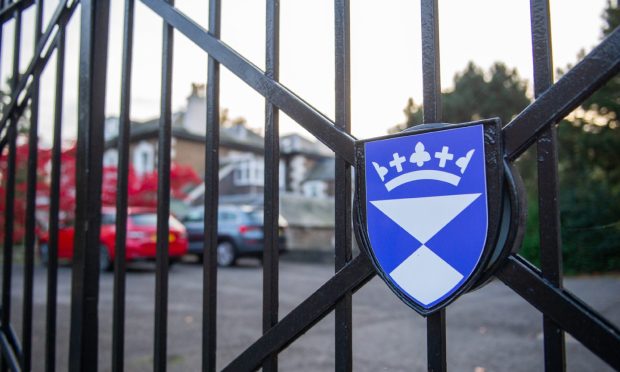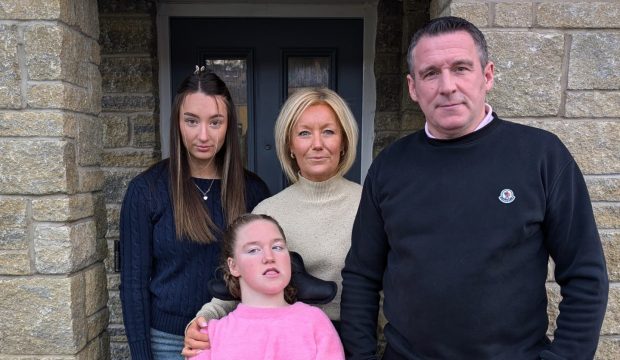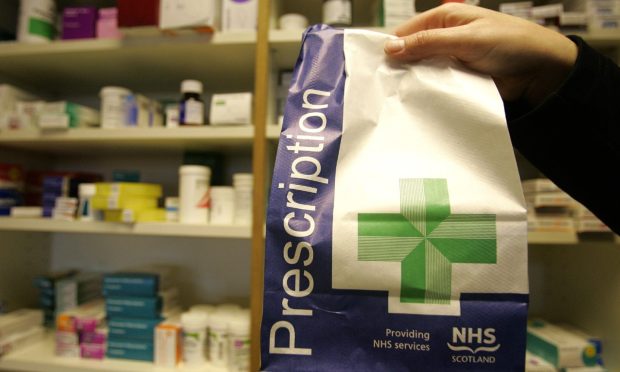When nurse Paul Smith’s children were ill, he was reassured when he was able to call NHS 24 and receive healthcare advice over the phone.
Now several years later, dad-of-two Paul is himself one of the potentially life-saving voices answering calls coming into the out-of-hours 111 service at the contact centre in Dundee.
The nurse practitioner and the Dundee-based team of 18 receive calls from all over Scotland and their job is to triage patients to assess their condition before pointing them in the right direction.
With many community services, including GPs and pharmacies, altering their opening times over Christmas and New Year, the staff based at the Kingscross Health & Community Care Centre, will be helping those in need of medical advice.
As Paul (pictured below) only joined NHS 24 in February this year, it will be his first Christmas Day shift as a 111 call handler. But with 21 years’ experience in different healthcare roles – from staff nurse to Senior Charge Nurse – he is used to working at Christmas.

He said: “People are unwell every day and need our advice and support, so Christmas or New Year is just another day for all our healthcare workers. Our patients always come first.”
Nationally, NHS 24 receives between 2,500 (on weekdays) and 8,000 calls a day (at weekends), but over the holiday period calls escalate to a staggering 44,886 over Christmas and 50,898 over the New Year break.
Paul and the team at Tayside handle a share of more than 1.5million calls each year, and the centre is one of 11 local centres run by NHS 24 in partnership with NHS Boards across Scotland in addition to the four main contact centres..
The buzz of working in this busy contact centre appealed to Paul when he felt he “needed a new challenge” after more than two decades treating patients on hospital wards.
“I jumped at the chance of using my knowledge to help others in a different way with NHS 24,” he said.
“Many calls can be easily dealt with by giving general advice and redirecting to either the GP or pharmacist if needed, or our nhsinform.scot website where they can check symptoms and find self-care guides.”
He added: “You can get calls at any time. Some can be quite straightforward, for example, people looking for healthcare or medicine advice, coughs, and colds to serious calls including chest pains, collapse, seizures and a large amount of those requiring mental health advice and support.
“No two calls are the same so you have to have a wide variety of knowledge to ensure that the best advice is given. A lot of the symptoms we get calls about can be managed at home with good self-care.
“The message at this time of year is to make sure you have enough over-the-counter remedies at home (like paracetamol, ibuprofen, Calpol for children, anti-histamines and rehydration salts) for common winter illnesses.
“We also receive a lot of calls from people who’ve forgotten to collect their prescription. So the advice is to order only what you need to cover you over the holiday period, be prepared and check your GP’s opening hours.”
People dial 111 because feel they need a fast medical assessment (but do not require an ambulance) or are looking for advice about whether to attend the local Emergency Department.
Some, unaware of the severity of their condition, may require urgent medical attention and may have called 111 because they don’t want to bother the ambulance service.
Paul admitted calls like these are “challenging and emotionally distressing”, but as with each call handler, everything he has learned in training kicks in and he manages each call in the same calm manner, never rushing anyone off the phone, no matter how busy the centre becomes – and this is the same over the festive period.
“All our patients are treated with the same level of dignity and respect and hopefully we are that voice of calm, or reason, during their time of distress,” he said.
Medicine Cabinet Essentials
To make sure you stay health-wise over the festive period, stock your medicine cabinet up with these over-the-counter remedies..
Pain relief
‘Tis the season for coughs and colds so stock up on painkillers such as paracetamol, ibuprofen and aspirin to help to lower your temperature if you have a fever.
Stomach settlers
Tummy ailments such as diarrhoea, constipation and indigestion are particularly common at this time of year so keep a supply of over-the-counter medicines to help with those symptoms.
First Aid Kit
It’s always a good idea to keep a basic first aid kit at home to treat minor cuts, bruises and burns. Antiseptic cream or wipes, multi-sized plasters, bandage, gauze and tape should be top of the shopping list.
Children’s medicines
Kids require different dosages to adults so make sure you have junior versions of essential medicines such as painkillers and cough mixtures so you know exactly how much to give them when they’re unwell.
Antihistamines
Often used to treat allergic reactions or conditions such as rashes, antihistamines are a good thing to keep at home to help provide relief from milder symptoms.
Your Festive Health Checklist
- Find out the opening hours of your GP surgery over the festive period.
- Make sure you have medication, and collect repeat prescriptions in plenty of time to avoid running out, but don’t over-order.
- Keep your medicine cabinet well-stocked.
- Try to look after yourself and family members with cold, coughs and flu-like at home as best you can.
- If in doubt, or you need non-urgent medical advice, contact your local pharmacy (you can find your nearest one at www.nhsinform.scot by keying in your postcode).
- You can use www.nhsinform.scot to assess your own symptoms and access a range of free self-help guides. If symptoms are getting worse and you are concerned contact 111.
- If you believe you, or someone you know, is having a heart attack or stroke, then call 999 immediately.










